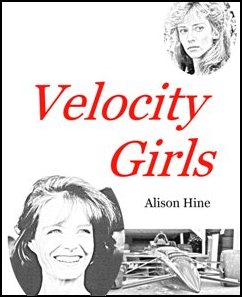 Excerpts
from Velocity Girls
Excerpts
from Velocity GirlsDealing with sponsors and spectators and crew and all the other people at a race track were things Kate had to do, not things she wanted to do. She itched for this moment: settled behind the wheel, belted in, everything else shut out. She flicked on the switches and listened to the starter whir. When the engine came to life its harsh vibration through the seat and steering wheel made her smile.
She put the car in gear, punched the throttle, and dropped the clutch. The engine shrieked and her mirrors reflected a belch of blue smoke from her tires, first a wisp and then a cloud. The acceleration slammed her back as though she were strapped to a rocket sled. So much for overnight processing.
At 60 MPH the car’s pit lane speed limiter cut the engine’s thrust and she was thrown forward against her belts. This lasted only for a few seconds until she reached the end of the pit lane and released the speed limiter button.
She was free.
Yesterday had been hell, but today the car was sweet, and by the end of the second lap she was in a rhythm. She was no longer driving a car, she was the car, and she could feel every ripple in the track surface, every paint stripe, every little bump and crack through her four tires.
She sprang from corner to corner, swooping from turn-in to apex to track-out, balancing the car on that thin edge of adhesion where the grip is the greatest and where if you go just a little bit faster, the tires will let go and you’ll be in the wall.
Everything began to flow, and she was shifting up, braking, shifting down, turning in, flowing – hurtling – dancing past the apexes, flirting with the walls but never touching them, laying down the line and floating through the corners in a way that, just for the moment, turned technology to grace, sport to art; transformed the wailing of the engine and the heaving of the chassis from the physics of steel and rubber and aluminum to a stunning and wholly gratifying ballet, a poem in three dimensions, a lyric without words.
“Come back to
Rachel stood at the back door in the kitchen of the house that had been her father’s, gazing out across the yard. “I’ve always liked the way the morning sun lights up the leaves. Especially in the fall.”
Kate moved closer. The sight was beautiful. The reds and golds of the maple leaves, wet with dew, gleamed in the sun. The trees near the house cast dappled shadows across the lawn. Along one side, the house blocked the light; there, grass and trees were left in darkness.
“Rachel, I have to go back. I don’t want to leave you here alone.”
She was conscious of odors that normally passed her by: the perfume of the dishwashing liquid from the bottle on the counter, the faint smell of damp grass and fallen leaves wafting through the window over the sink, the scent of Rachel’s hair.
Rachel stirred. “Did you ever notice the way the scrollwork on the eaves casts a shadow on the grass? It looks so ornate.” She tapped the glass once, twice. “Almost twisted.”
Kate had never noticed before. The shadow did look twisted, the symmetrical, carefully crafted wood workings that decorated the outside of the old house distorted into something not quite sane.
Kate shivered. “It’s cold in here.”
Rachel took a long drink. “You know,” she said, “I can’t get what he did out of my head. It’s like he’s haunting me.”
Kate put her glass down. She remembered his voice, his basement shop, him standing at his lathe. She could almost smell the sawdust. “What haunts you the most?”
Rachel shook her head. “Everything. I can’t forget what he did. What I did.” She put her head in her hands. “I’m the world’s most impaired emotional cripple.”
Kate touched her arm. “I’d never noticed any such thing.”
Rachel flung a sofa cushion across the room. “Fuck me.” She hugged her knees. “I know it’s true.”
Kate tried to think of something comforting to say. “Come on, Rachel. Everybody has issues. You’re doing the best you can.” Lame.
Rachel looked at her. “Yeah. You’re right.” She rubbed her face. “But there’s something else. My little hangups are …” She took a deep breath. “They’re about you.”
Kate moved to the sofa. She stroked Rachel’s dark curls. “Me? What did I do?”
“It’s not what you did. It’s who you are.”
“I’m sorry,” she said, trying to make her tone light. “I’ll change.”
“Don’t be silly. What you are is good, not bad.” She leaned toward Kate. “Listen,” she said. “I should have said this years ago. But I didn’t.”
Kate was aware of her closeness. The warmth of her body, her scent. She could have counted her lashes, the striations in her gray irises. She wanted to touch her.
No, she reminded herself. No.